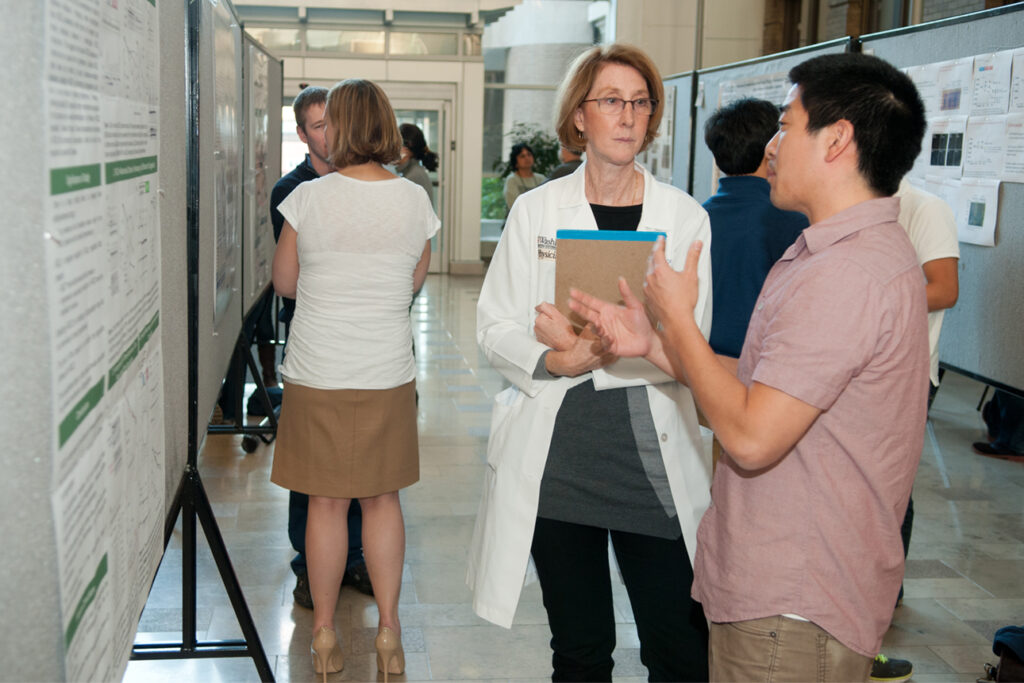
Our cardiology fellowship program seeks to develop creative leaders in cardiovascular medicine. A fundamental goal of the research and scholarly training component of the program is to help fellows learn how to ask and answer high-impact, hypothesis-driven scientific questions. Whether your career goal is an independently funded investigator or a full time clinician, this fundamental focus is the same. We emphasize the importance of curiosity, skills, resources, and mentorship as keys for fellows’ success not only during the fellowship but also throughout their careers.
The fellowship uses a competency-based, learner-center approach with robust mentorship and structured, yet flexible activities aligned with fellows’ career goals. The program brings each cohort together for dinners to discuss fellows’ career and scholarly interests. Advanced research and scholarly training opportunities are available for fellows across the translational science spectrum (Figure 1) under the mentorship of a large number of extramurally funded faculty physician-scientists. An important strength of our fellowship program is the breadth and depth of scholarship that our faculty and fellows pursue.
Specific activities and opportunities for each year include:
First Year
- Complete responsible conduct of research training.
- Join the Institute for Clinical and Translational Sciences at Washington University.
- Develop an individual development plan.
- Develop understanding of macro-level clinical and research training options during fellowship.
- Identify primary research mentor and mentoring team. Network inside and outside of the division.
- If applicable, submit application for relevant master’s degree program, such as the Master of Science in Clinical Investigation.
Second Year
- Update individual development plan to match career goals.
- Submit and receive feedback for research proposals.
- Begin proposed research activities, including learning fundamental research skills, with an emphasis on how to formulate and investigate high-impact and testable hypotheses to address important problems in the field.
- Submit progress report and NIH-style biosketch for feedback.
- If applicable, begin master’s program or other relevant coursework.
- If applicable, submit grant application for intramural and extramural post-doctoral research fellowship awards, including the T32-funded Principles of Cardiovascular Research Training Program and the NIH Loan Repayment Program.
Third Year*
- Update individual development plan to match career goals.
- Complete initial research project(s), including seeking peer reviewed publication.
- Submit abstract and present at Cardiovascular Research Day.
- Develop advanced research skills for career development with one of the division’s many experienced faculty physician-scientists.
- Develop and implement ambitious, realistic plans to secure post-fellowship position that will help you launch your career as a future leader in cardiovascular medicine.
*Fellows who seek a research-based career will typically participate in additional research training with faculty mentorship to gain the necessary skills, experiences, and networks for the next stage in their career. Figure 2 shows a list of NIH funding programs by career stage.
Faculty lead and participate in a wide range of research institutes, centers, and cores at Washington University, including:

Institute for Clinical and Translational Sciences
Center for Cardiovascular Research
Mouse Cardiovascular Phenotyping Core
Consortium for Translational Research in Advanced Imaging and Nanomedicine
Cardiovascular Precision Medicine Research Initiative
Center for Cardiovascular Genetics
Center for Investigation of Membrane Excitability Diseases
Center for Noninvasive Cardiac Radiotherapy
Center for Hypertrophic Cardiomyopathy
Cardiovascular Imaging and Clinical Research Core Lab
Center for Community Health Partnership and Research
Center for Advancing Health Services, Policy & Economics Research

Faculty also lead and participate in cutting-edge clinical research in heart failure, cardio-oncology, and electrophysiology, among other areas.